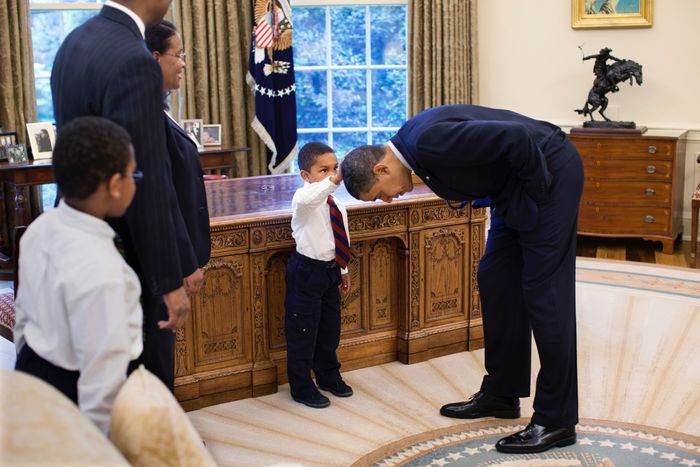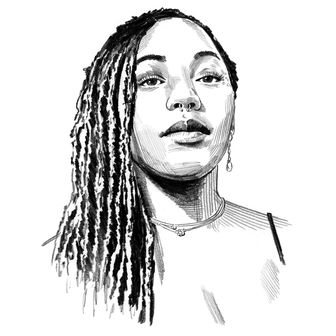
10 Years Since Trayvon: The story of the first decade of Black Lives Matter.
I was 17 when President-elect Obama walked across the stage in Grant Park with his Black, beautiful, accomplished wife and their two young Black daughters to give his acceptance speech. It’s a hazy memory. The morning after, still groggy, I wondered if I drifted during coverage and dreamt it. Coming out of her bedroom, slow and curious like a shadow, my mother stood beside me, mouth agape at the television screen. “I can’t believe it,” she whispered, as if not to awaken some alternate reality. It was what one might imagine a fantastical, spectacular culmination of thousands of years of struggle to feel like. It was satisfying, the spite of it all: this Black man, on this stage, with his Black family, knowing there were witnesses who doubted his legitimacy or, worse, would rather see him dead than occupy the White House. I’d never felt that high of representation mirroring me.
President Obama was president for eight years. I’m 30 now and staring down the greatest threat to African American voting rights in generations. A climate crisis threatens the livelihoods of the Black and poor, of the Black and coastal, of the Black and immigrant. We face a wealth gap that has only worsened in the last decade, leaving Black communities even more vulnerable to the failures of late-stage capitalism than they already were before the First Black Presidency. As the killings of Trayvon Martin and Freddie Gray, the loop of uprisings that followed, and the anti-capitalist, socialist movement of Occupy Wall Street shaped our perspectives, young people of the Black Lives Matter generation learned quickly, and with much devastation, that representation had a hole in it where our ideas of justice rooted in policy dematerialized. We had set the bar too high. We expected our first Black president to decry the actions of the racist police, to call off the dogs and stand unequivocally with protesters — to somehow inherit Martin Luther King Jr.’s project of disarming white supremacy and see it through to a different end. He didn’t. He hedged and stood tall in two-sides-ism, calling angry civilians thugs and their uprising a counterproductive distraction to the more “peaceful” protesters doing things “the right way.” What we expected of the Obama administration was beyond what the framework of the presidency allowed. That was a heartbreaking realization. Some of us came to it sooner than others.
Police departments and some communities “have to do some soul-searching,” Obama said in an address to the nation the afternoon after Baltimore burned following Gray’s funeral. “But I think we as a country have to do some soul-searching.
Try as we might, no generation can escape the solipsism of disappointment. I blush some at the reality that there are plenty who came before us, those elders and mentors and teachers who organized in labor movements of the ’70s and ’80s, radical Black feminists of the Combahee River Collective who studied socialist theory, and antiwar movements of the ’60s. They were plenty skeptical. And said as much. “In the practice of our politics,” the Combahee River Collective Statement drafted in 1977 says, “we do not believe that the end always justifies the means. Many reactionary and destructive acts have been done in the name of achieving ‘correct’ political goals.” It feels like a warning. Learning from the scholarship of the organizers who came before us might’ve cost us less suffering.
In essence, President Obama did exactly what he was supposed to do, what every white man in this position before him had done — prove to America that he was president for all, subject of and beholden to loyalty to country. For some Black Americans, the talented-tenth generation, older and more keen on respectability, this was evidence of progress, proof positive that he’d fulfilled the ultimate goal of assimilation — permission to be free from the obligations and limitations of race. For my fellowship, the generation of Occupy Wall Street and Trayvon Martin, such wish-fulfillment was a loss. When Obama was on the campaign trail for president, there was still a part of him that was ours: He was supposed to be the Organizer from Chicago. We’d heard that he had cut his teeth on the stones of our history. But the day he crossed that stage as president-elect, he became the figurehead of the elite, of the ruling class, a symbol of its evolution toward a new racial permeability — the kind that exists to create a new, racially integrated class of leaders only meant to continue the project of neoliberalism and its genesis, white supremacy.
What my generation started to learn about power the day of Obama’s Baltimore remarks was that the power of the people might never translate to the presidency. That emulating the power structures that govern us could only get us so far. Most critically, we started to learn that, regardless of how successful representation might appear, representation alone isn’t The Work. One too many “Cousin Pookie” references on top of President Obama’s suggestion that Black poor mothers feed their children cold Popeye’s for breakfast, and we’ve seen representation’s ugliness made plain.
Already, we’re seeing reticence and a growing collective side-eye reflected in recent elections, where Black candidates and electeds struggled to ignite the Democrats’ most reliable base through the fog and fatigue of a post-Obama, post-Trump world. In New York City, where new mayor Eric Adams has already begun to reinstate archaic, racist policing strategies like the controversial Anti-Gun Police Unit to go with his general cop rhetoric, or in San Francisco, where nearly a decade ago, the state’s “top cop” would refuse to investigate and prosecute a series of killings by police, yet go on to become the current vice-president of the United States, there’s an asterisk next to the value of political representation, a gnawing feeling that it may have been a bad gamble. Perhaps we’ve opened the proverbial door so wide that it smacks us in the ass. We’ve sat on America’s throne, history has been made in name — but in Georgia, Stacey Abrams gears up to run a race she should never have lost in the first place as franchisement for Black voters is rolled back little by little each decade. We’ve earned our skepticism.
Representation has, in many ways, gotten us closer to the truth about how our politics actually work. And it’s taught us everything we need to know about power: that it’s a limited resource. That figureheads of democracy are just figureheads unless the tools of democracy belong equally to the people furthest from the power structure. It taught us that while the ruling class has racial permeability, our ability to move through the corridors of power doesn’t inherently constitute an ability to change the structural functions of power to empower. And it taught us that no matter who owns the keys to the White House, the power and persuasion of the executive branch will likely bend toward it. So, like any scarred romantic, young Black voters are more guarded of our vote, less tolerant of the two-page pamphlet on jobs and crime that many candidates have gotten away with calling race-conscious policy. It’s forced everyone to get more specific about what it really looks like to leverage the power of the federal government to protect and advance the rights and liberties of Black people.
When we hit the streets after the killings of Trayvon and Freddie Gray, we were demanding that Black children be free from racist policing — a general, while powerful, demand. Ten years later, after countless broken promises, reckoning only with police violence is a cop-out; we’re continuing the legacy of Occupy Wall Street, of Black feminist organizers, and are instead building coalitions focused on ending the police state. The priority shift should hardly feel surprising. Some of the same organizers and voters who marched at the height of the Black Lives Matter movement, and sat in the cold during Occupy as teenagers, are now adults. They’re also community organizers and national leaders done with rising through ancient ranks of control to build power. For them, reform isn’t enough. Neither are the old tactics of slow and steady restructuring or the persuasion of relatability and charm.
When we say we want leaders who represent us, we mean leaders who represent us on the issues, who represent those bound to these systems of power. Any candidate who wants the vote of the people who have time and time again been let down by a nation that has promised so much and delivered so little will have to speak the language of progress meaningfully to win meaningful results.
But I can’t, in good faith, say that representation politics have given us nothing. I loved the dream of the First Black President, and cherished the idea of President Obama. I can admit that I was still moved by the poetics of what representation could mean, by the endless metaphors it offered up about Blackness’ survivability and resistance. But what I discovered is that representation is, fundamentally, a metaphor. And a metaphor is made up of two parts, what Jericho Brown calls, the tenor and the vehicle. The vehicle of the metaphor, in its most literal sense, brings you closer to the thing you want to know more about, moves you closer to meaning. We say, “There is power in representation,” because power is the thing we want to know more about. And when we talk about representation in our politics, what we’re trying to understand is how power works and then how to emulate it. This is representation’s true utility: it tells us what we need to know about power so that we can get around it. It’s not the nail; it’s the hammer.
Perhaps President Obama, his quixotic nature soon replaced by the gray hairs and hard truths of his first term, felt himself trapped by representation. Trapped by the surveillance and vitriol associated with representation, by the weight and responsibility of being the first. Maybe he wanted to act up! Perhaps he dreamed of being the kind of president who could achieve universal health care, cut incarceration rates, and erase the myth of Black inferiority. And perhaps some of the grays can be attributed to late nights wondering whether Black people might understand just how much self-sacrifice went into doing that job with his head down all so that some snotty-nosed, morally superior kid who grew up seeing his face on the news could come along and feel self-affirmed enough to critique him. It would be an awkwardly fair irony.





